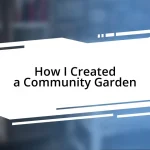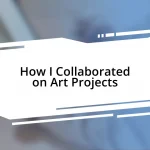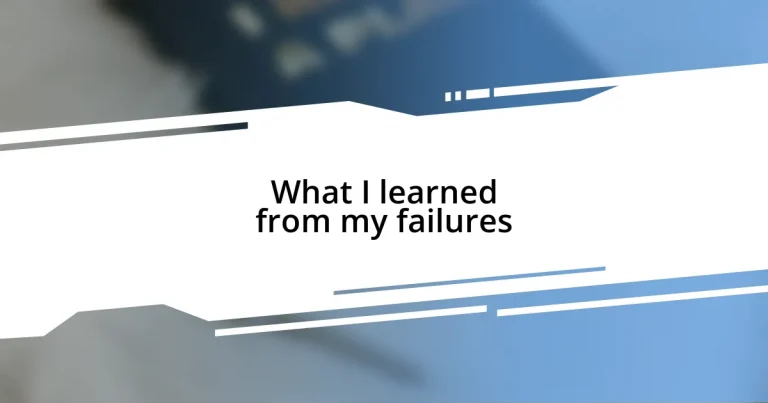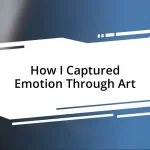Key takeaways:
- Failure is a valuable teacher, fostering personal growth and resilience through reflection and emotional vulnerability.
- Embracing vulnerability can lead to collaboration and innovation, turning setbacks into opportunities for learning.
- Identifying and analyzing failures is crucial for future success, enabling the development of actionable insights and effective strategies.
- Sharing experiences of failure fosters a supportive community, promoting collective growth and deeper connections among individuals.
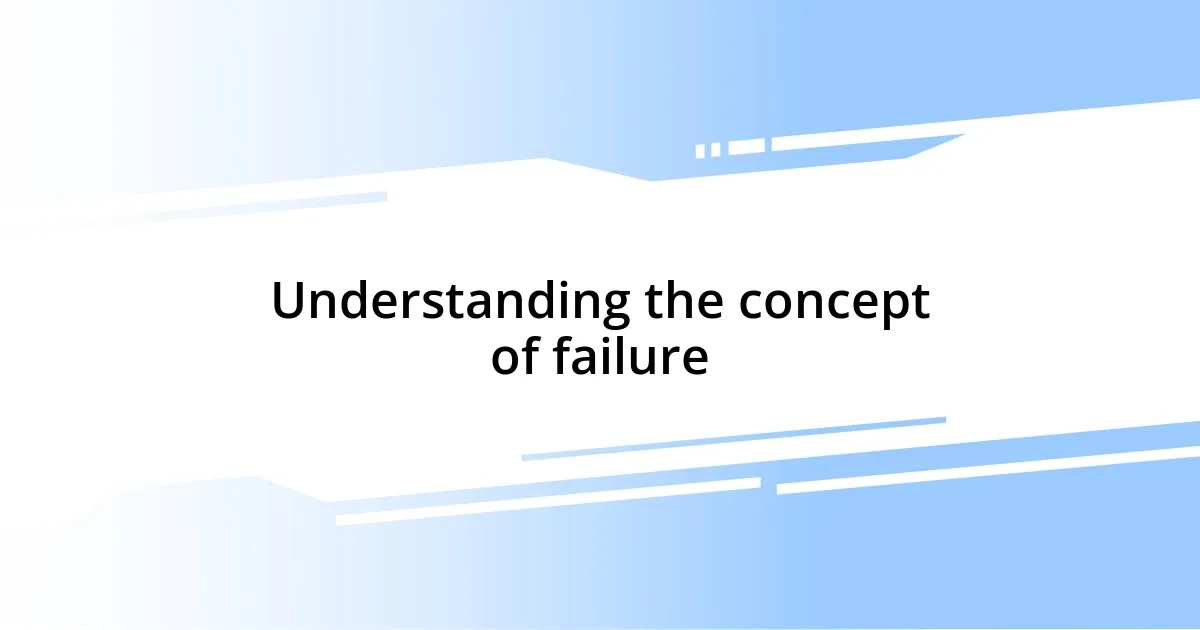
Understanding the concept of failure
Failure is often perceived as a negative outcome, but I’ve come to see it as a valuable teacher. I remember a project I passionately invested in that ultimately flopped. At first, I felt crushed, but looking back, I can identify the lessons I gained from that experience—lessons I might have missed had I succeeded right away.
When I think about the moments I’ve stumbled, I can’t help but wonder if I would have grown without those experiences. For instance, after a difficult job rejection, I found myself reflecting on my strengths and weaknesses. In that quiet contemplation, I discovered a renewed focus and a drive to improve, which eventually led to opportunities I couldn’t have imagined.
Understanding failure means embracing vulnerability. There’s an emotional weight to it, but the insight gained can be transformative. Have you ever found yourself hesitant to try something new because you feared failing? I certainly have. Yet, it’s in those very moments of vulnerability where the seeds of resilience and innovation are often planted.
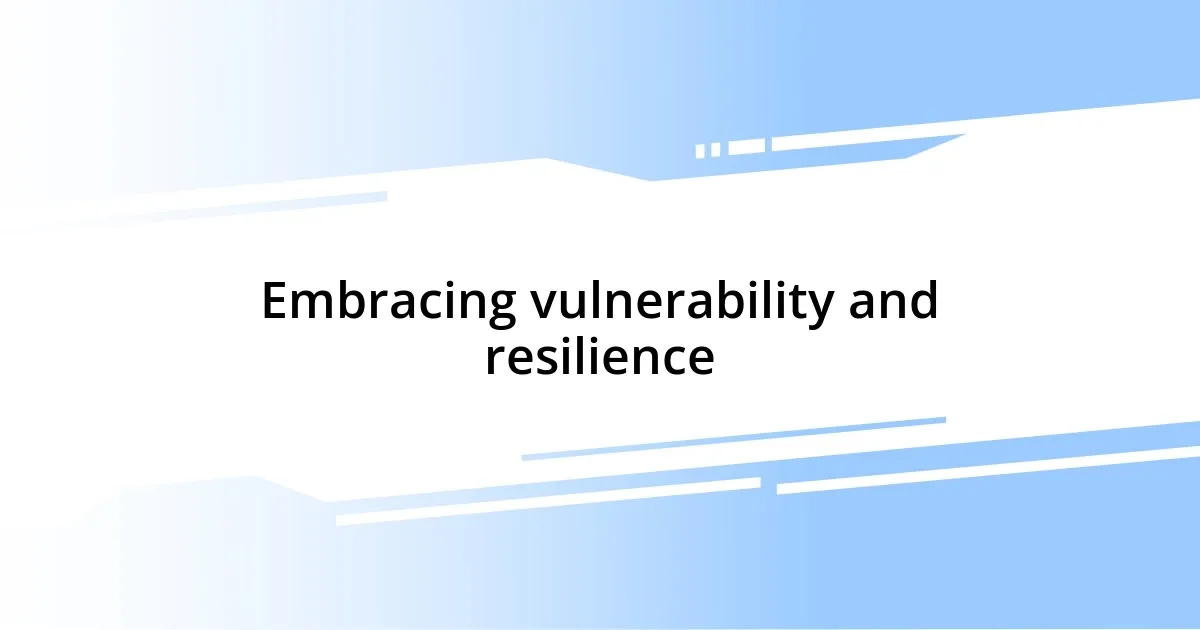
Embracing vulnerability and resilience
Embracing vulnerability is not a sign of weakness; rather, it’s a courageous step toward growth. I recall a time when I hesitated to share my thoughts in a team meeting, fearing criticism. After much contemplation, I decided to voice my ideas. The feedback was mixed, but it opened up a rich conversation that brought about a more innovative solution. This experience taught me that vulnerability can create genuine connections and foster collaboration.
Resilience often emerges from these moments of emotional exposure. I once faced a significant setback in my career when a promotion I longed for slipped away. Initially, the disappointment was overwhelming. However, as I processed my feelings and sought support from peers, I transformed that setback into a stepping stone. I learned that bouncing back isn’t just about grit; it’s about processing emotions and channeling them into constructive action.
Ultimately, I find that embracing failure is an ongoing journey of self-discovery. Every time I stumble, instead of retreating, I lean into those challenging moments. They offer rich lessons—like the time I nearly lost a key client due to a miscommunication. The experience taught me the importance of clarity and follow-up. I now approach every challenge with openness and curiosity, recognizing that each failure is an opportunity to cultivate resilience.
| Aspect | Embracing Vulnerability | Building Resilience |
|---|---|---|
| Definition | Willingness to expose oneself emotionally | Ability to recover from setbacks |
| Example | Sharing ideas despite fear of judgment | Learning from a professional setback |
| Outcome | Fosters connection and collaboration | Develops strength and perseverance |
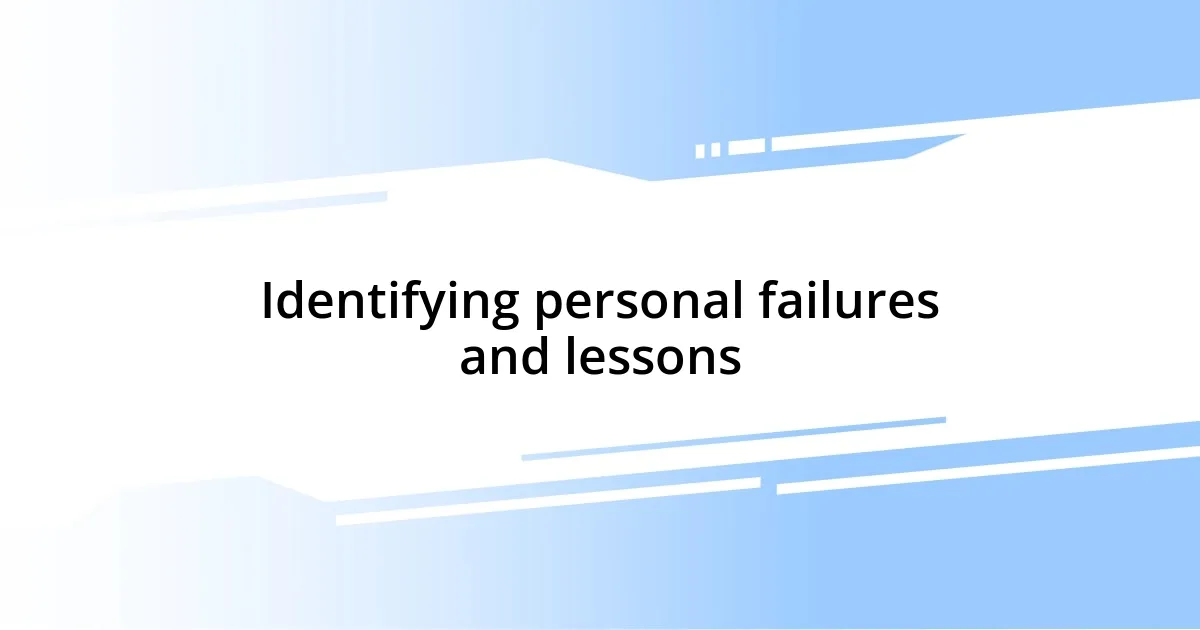
Identifying personal failures and lessons
Identifying personal failures can often feel daunting, but I believe it’s the first step toward true growth. One time, I took on a project that I thought would showcase my skills, but it fell flat. Rather than wallowing in disappointment, I took a moment to dissect what went wrong. I realized my approach lacked sufficient research, which was a hard pill to swallow. But that painful realization taught me to always prioritize thorough preparation in future endeavors—a lesson that I carry with me regularly.
- Strip away the emotional layers: Reflect honestly on what went wrong.
- Seek feedback: Sometimes, outside perspectives can illuminate blind spots.
- Document your thoughts: Journaling can help clarify lessons learned.
- Embrace discomfort: Each failure can spark discomfort that leads to growth.
- Regularly revisit past experiences: This practice keeps insights fresh and actionable.
Once, I vividly remember how a failed presentation left me feeling vulnerable and embarrassed. Instead of hiding away, I shared my experience with a trusted colleague. This act of vulnerability opened up a valuable discussion about effective communication strategies and ways to connect with the audience. From that moment, I learned not to shy away from uncomfortable situations. Instead, facing them head-on can unveil substantial lessons about my skills and areas needing improvement. By owning those moments, I’ve developed a clearer understanding of how to approach future challenges with resilience and insight.
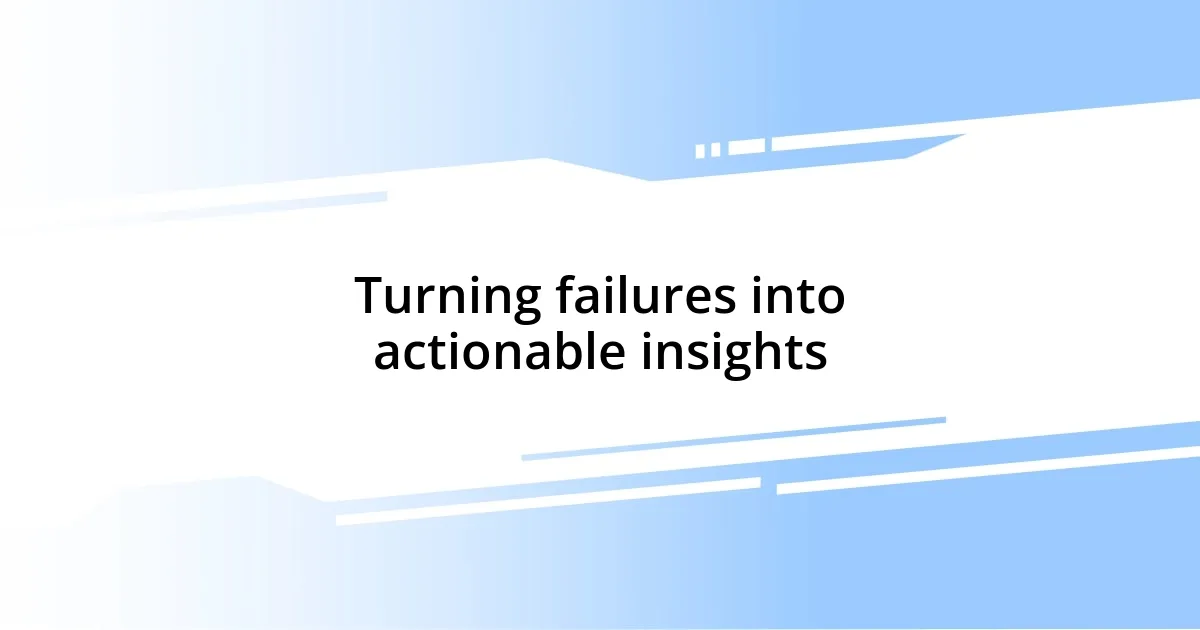
Turning failures into actionable insights
The ability to extract actionable insights from failure has been a game-changer for me. I remember a time I launched a marketing campaign that completely missed the mark. Instead of blaming external factors, I took a step back to analyze the feedback and data. What was it that really didn’t resonate? This reflection allowed me to identify gaps in my understanding of the target audience. From that moment forward, I began developing my campaigns with a deeper focus on research and empathy, transforming past missteps into powerful strategies for future successes.
Have you ever found yourself in a similar position, grappling with a setback? I often do—and it’s usually after a failure that I turn to my trusted circle for insight. I once experienced a major software glitch during a big presentation, leaving everyone, including myself, flustered. Rather than shying away from the embarrassment, I opened up to my colleagues about what happened. Their thoughts clarified not only the technical aspects I could improve but also highlighted the importance of having backup plans. This feedback loop transformed a frustrating moment into an actionable checklist for my next presentation.
It’s curious how failure can act as a catalyst for personal growth. When I once missed a crucial deadline, it hit hard—not just because of the implications but because I felt I had let down my team. I took that experience to heart, analyzing how I managed my time and commitments. In that exploration, I crafted a new system that prioritized my tasks while allowing room for unexpected hurdles. This pivot didn’t just make me more efficient; it deepened my respect for the process. Failure has taught me that every stumble can illuminate a path forward if I’m willing to look closely with an open mind.
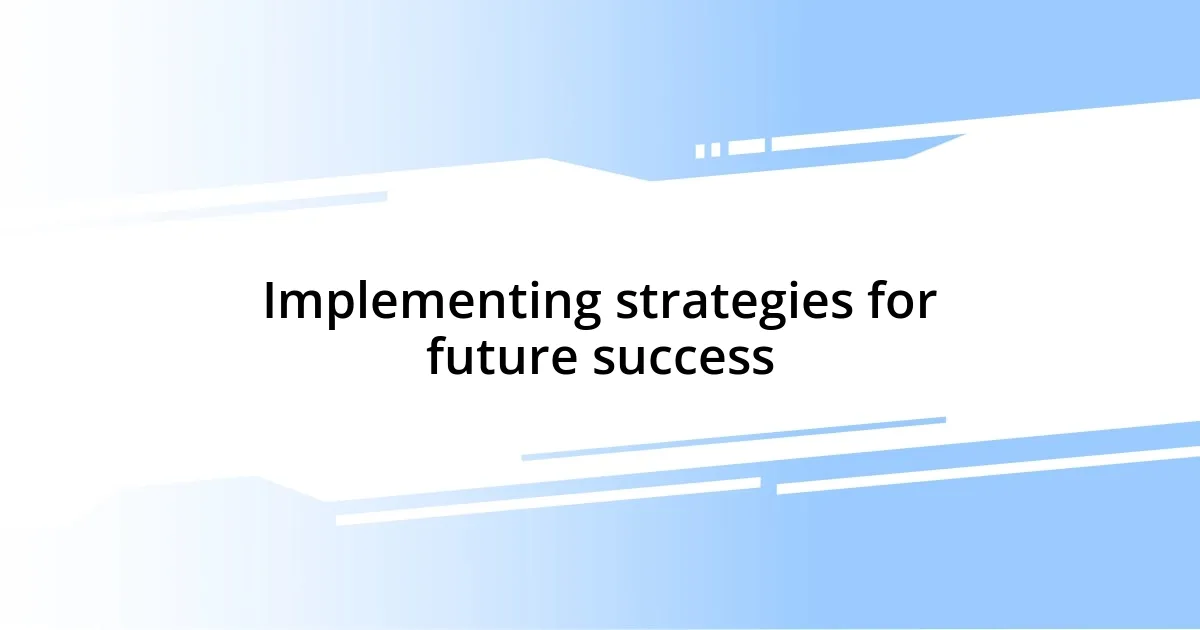
Implementing strategies for future success
Implementing effective strategies based on my past failures is something I’ve really embraced over the years. I remember starting a new job and assuming that my previous successes would seamlessly carry over. Instead, I quickly found myself overwhelmed and struggling to adapt. This experience pushed me to set intentional goals and create a structured plan for my first few weeks. By mapping out my priorities and checking in regularly on my progress, I not only improved my performance but also regained my confidence in a new environment.
One strategy I love involves setting up a learning circle. After an unexpected setback in a team project, I initiated regular meet-ups with colleagues to share our experiences and insights. These sessions soon became a safe space where we could discuss our failures openly, transforming what could have been a stagnant learning environment into a lively hub of creativity and collaboration. It really hit me then – sometimes, collective wisdom is the best antidote to personal failure.
Have you ever noticed how failure can obscure our vision of what’s possible? I certainly have. After a failed product launch, I felt crushed and almost resigned. But when I took a step back, I realized that failure isn’t the end of the road; it’s a signpost. Fueled by this realization, I started actively seeking feedback from users before any launch. The act of inviting others into the process turned my previous hurdles into stepping stones, empowering me to develop products that truly resonate with the audience. Isn’t it fascinating how reframing failure can lead to newfound clarity and purpose?
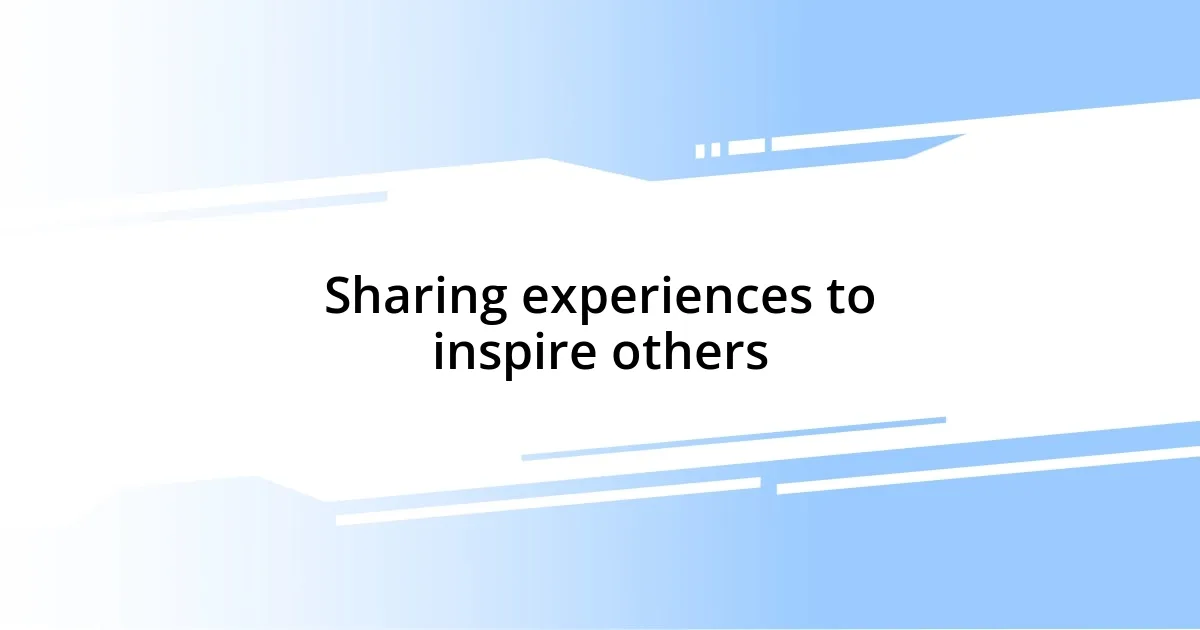
Sharing experiences to inspire others
When I think about sharing my failures, a memorable experience comes to mind: I once conducted a workshop that didn’t go as planned. Initially, I felt defeated, but I decided to reach out to attendees for feedback. Their honest critiques, though tough to hear, opened my eyes to what I could improve. Would I have made these enlightening adjustments if I hadn’t shared my experience? I doubt it. That openness not only fostered a supportive community but empowered me to grow far beyond that initial setback.
I remember vividly a time when I failed to meet a project goal, leaving my team disheartened. Instead of hiding it away, I decided to share a detailed account of what went wrong in a team meeting. The reaction was overwhelmingly positive; I found that my vulnerability encouraged others to share their own experiences. This moment taught me that when we share our stories, we unlock a space for connection, allowing everyone to learn from each other. Doesn’t it feel powerful to know that by sharing, we can transform individual struggles into collective growth?
It’s funny how simply talking about failures can lighten the burden. One evening, I spilled my frustrations about a failed business venture during a casual dinner with friends. To my surprise, they provided perspectives that I hadn’t considered. They shared their own stories of defeat, moments that shaped their paths. It struck me then—sharing isn’t just about the lessons learned; it’s also about building relationships that flourish through mutual struggle. What if each conversation held the key to unlocking deeper insights? I’ve come to believe that every shared experience is a thread in the tapestry of inspiration we can create together.






